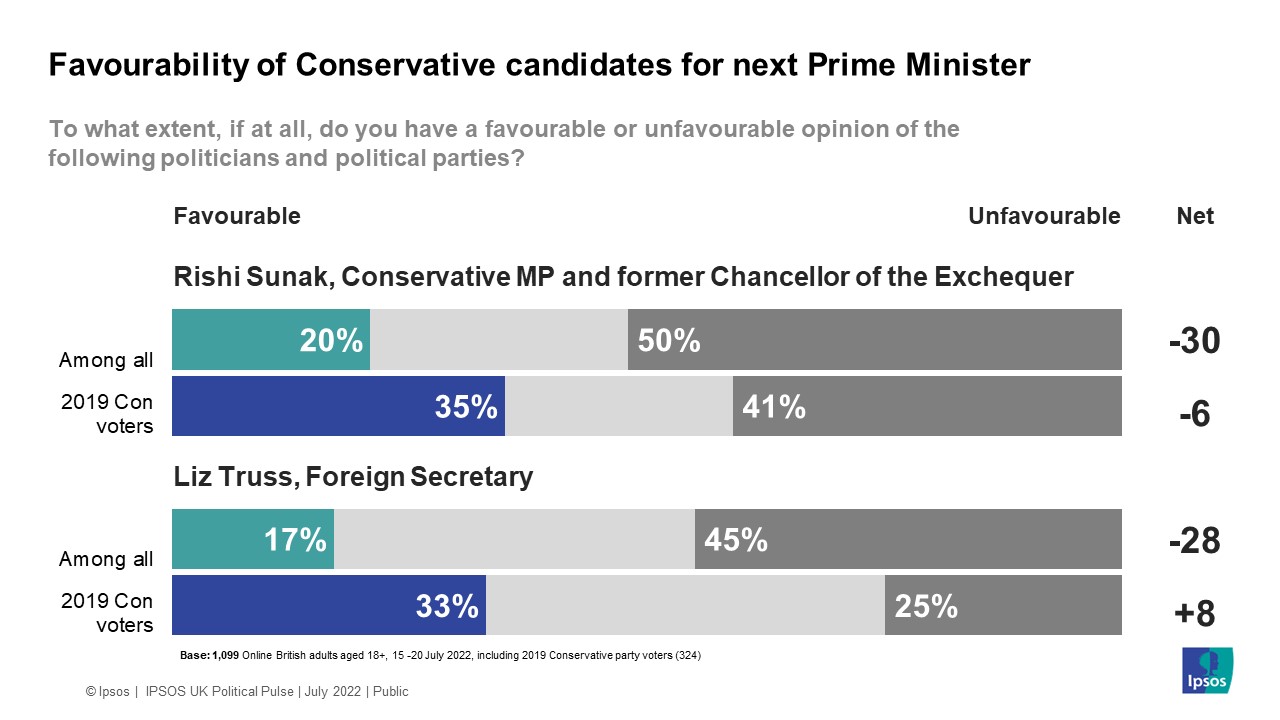Focus on cost of living and public services Britons ask Sunak and Truss
There is little to choose between public favourability scores for Sunak and Truss.
- The public most want to hear Conservative leadership candidates talk about plans for the rising cost of living and public services such as the NHS and schools
- 2019 Conservatives also place importance on immigration / border security & economic growth
- Sunak and Truss register similar favourability scores amongst the public as a whole, though both receive higher negative scores than last month before the resignations
The latest Ipsos UK Political Pulse survey, taken July 15th to 20th, asked the public what subjects they most want to hear the Conservative leadership candidates talk about their plans for, as well as how favourable or unfavourable they are towards each candidate.
What should Sunak and Truss focus on?
- The top two subjects the public want the candidates to focus on are the rising cost of living (58%) and public services such as the NHS and schools (42%). Poverty and inequality in Britain (35%) and economic growth (34%) were the other issues prioritised by at least 1 in 3 Britons.
- Amongst those voting Conservative in 2019, the rising cost of living was also the subject that topped the list (64%) but amongst this group immigration and border security ranked in second place (53%), followed by economic growth (44%) and public services such as the NHS and schools (41%).

Favourability towards Sunak and Truss
- There is little to choose between public favourability scores for Sunak and Truss.
- Overall 20% are favourable towards Sunak (down 6 points from June, from before the resignations), 50% unfavourable (+8 points). 17% of Britons are favourable towards Truss (-1pt) and 45% are unfavourable (+7 points).
- In comparison, 18% are currently favourable towards Boris Johnson (-4pts) and 60% unfavourable (+ 4 pts).
- 24% are favourable towards Starmer (-1 pt) and 43% are unfavourable (+3pts).
- Among Conservative 2019 voters, both have similar favourability ratings, but Sunak has higher negative scores. 35% of 2019 Conservative voters feel favourable towards Sunak (-12 points from last month, again note this was before the resignations), 41% unfavourable (+19), while 33% feel favourable towards Liz Truss (+2 points), 25% unfavourable (+4).

Favourability towards political parties
Elsewhere in the poll, the public are more favourable towards the Labour Party than the Conservatives.
- Labour 29% favourable (nc from June). 41% unfavourable (nc).
- Greens 25% favourable (-2pts). 32% unfavourable (nc).
- Conservatives 22% favourable (-2pts). 52% unfavourable (+3pts).
- Lib Dems 19% favourable (-3pts). 36% unfavourable (+1).
Keiran Pedley, Director of Politics at Ipsos UK, says of the findings:
Neither Rishi Sunak, nor Liz Truss start from a strong position in terms of public favourability scores and so whichever candidate wins will need to deliver quickly to recover the Conservatives’ challenging current political situation. Both have seen a trend of decline in their ratings, although this is more noticeable for Rishi Sunak. The public as a whole want to hear more about each candidates’ plans to address the cost of living and improve public services such as the NHS and schools, with 2019 Conservatives also keen to hear about plans for immigration and border security as well as economic growth. So expect to hear more from Sunak and Truss on these subjects in the weeks ahead.






